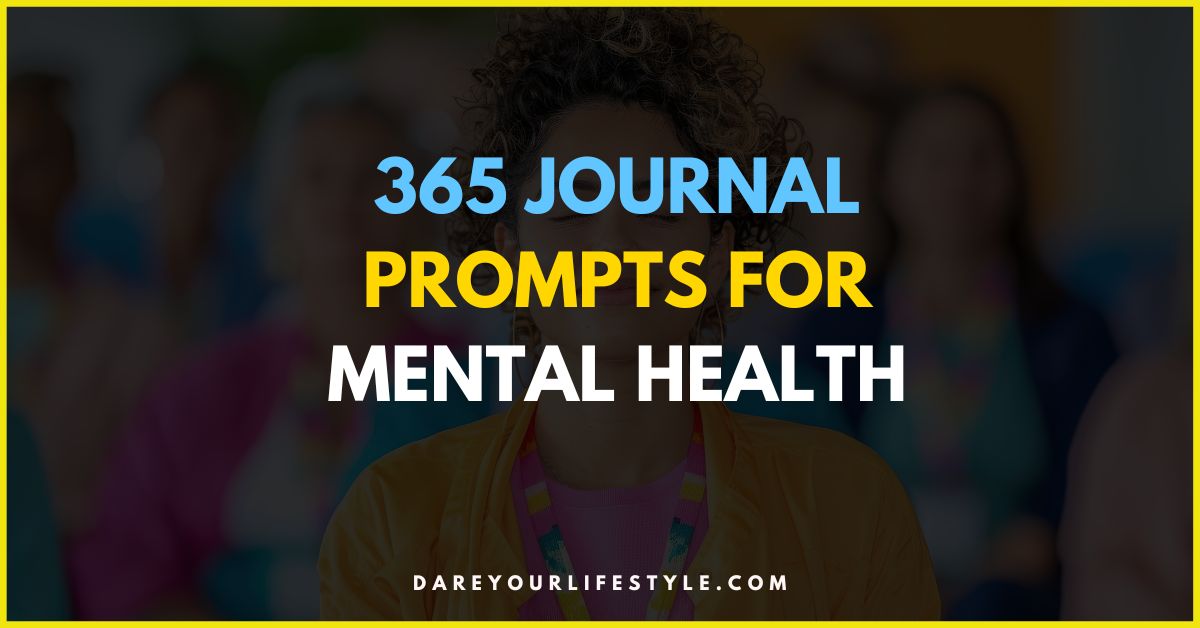Disclaimer: This post may contain affiliate links, meaning we get a small commission if you make a purchase through our link at no extra cost to you. For more information, please visit our Disclaimer Page.
You carry stress and worries without realizing how much they affect your daily life. Sometimes you think feeling overwhelmed is just normal. These 365 journal prompts create the space you need to listen to what your mind and heart are really telling you.
Some days you need a safe place to express raw feelings without judgment. Other days you want direct questions that challenge your thinking and give you fresh perspective on tough situations. This isn’t about finding quick answers – it’s about creating room to be completely honest with yourself.
When you write consistently, you create space to spot emotional patterns, question limiting beliefs, and reconnect with parts of your true self you might have forgotten. This type of personal reflection won’t fix everything overnight, but it’s a powerful way to stay grounded when everything feels uncertain.
Table of Contents
Why Journaling Transforms Your Mental Health
You might wonder why taking a few minutes to write makes any real difference. Journaling is a game-changer for improving your mental and emotional state. It’s much more than putting words on a page – it’s a practice that offers a wide range of benefits.
It Clarifies Your Feelings
Have you ever felt a tangled knot of emotions and struggled to figure out what was going on inside? Writing helps you untangle that knot and sort things out. When you write, you slow down and put a clear name to the exact emotion you’re experiencing.
Is it quiet sadness, boiling anger, lingering frustration, or sudden unexpected joy? Identifying your emotions clearly is the first step toward managing them better. It’s like turning on a searchlight in a dark room.
It Reduces Stress and Worry
When thoughts race through your mind uncontrollably, that feeling can be overwhelming. Writing those thoughts down gets them out of your head and onto the page where they’re safe. This simple act of putting your thoughts outside of you is deeply calming.
It feels like emptying an overloaded backpack – suddenly you have mental space to think clearly. Scientific studies show that expressive writing can lower your body’s stress hormones and contribute to improving your overall physical health.
It Builds Self-Awareness
Your journal acts as a mirror for your inner self, helping you see things you couldn’t before. You begin to notice patterns in your thinking, spot what triggers you, discover what makes you happy, and understand what you genuinely value. This self-knowledge is the main ingredient for making choices that align with who you truly are.
Getting Started: Tools and Techniques for Success
Now that you’re excited about journaling’s benefits, let’s talk about the simple steps to start your practice. You don’t need much to begin this habit.
What Tools Do You Need?
You only need a few simple things to start writing today. A dedicated notebook or journal works perfectly. This can be a spiral-bound notebook, an elegant leather-bound journal, or even a digital document if you prefer typing.
You also need a reliable pen or your computer keyboard. Use whatever encourages you to keep writing every day.
For digital lovers, you can try apps like Day One (a popular digital journal that syncs across devices) or the simplicity of Google Docs. Some people find that using an app like Journey helps keep them consistent with gentle reminders and structure.
How Often Should You Write?
You only need five to ten minutes a day. Consistency is more important than duration. The most important requirement is a completely open and honest mind. Let go of perfectionism entirely – your journal is for your eyes only.
Tips for Building Your Practice
Find Your Time: When do you naturally feel most capable of quiet reflection? This might be first thing in the morning, right before bed, or during a quiet lunch break. Stick to a time that works for you.
Find Your Space: Look for a quiet corner, comfortable chair, or bench at a local park. You need a place where you feel comfortable and won’t be interrupted.
Just Start Writing: Don’t worry about perfect grammar or spelling. Let words flow freely from your mind without editing. If you feel stuck, simply write “I don’t know what to write.” You’ll be surprised how often that gets words moving again.
Allow Yourself Honesty: Your journal is a safe place, so never judge your thoughts or feelings. Be completely honest here – this is the only place where you can truly be your authentic self.
Your Year of Emotional Wellness: 365 Prompts
Here are 365 distinct journal prompts designed to support your mental and emotional health. We’ve organized them into sections so you can focus on different aspects of your well-being. You can follow them in order, pick one that calls to you, or use a random number generator for surprise sessions.
Discovering Your True Self
These prompts focus on self-discovery, encouraging you to understand your values, strengths, and the deepest parts of your identity. Getting to know yourself fully is the foundation for good mental health.
Understanding Your Core Values
- What are three specific things you genuinely love about yourself today?
- Describe your ideal day from wake-up to bedtime.
- What beliefs do you hold about yourself that might not be entirely true?
- If you could talk to your younger self right now, what advice would you give them?
- What are your top five core values that guide your decisions?
- How do you see those values showing up (or not) in your daily life?
- How do you define personal success, ignoring money or public recognition?
- When was the last time you felt truly authentic without any pretense?
- What skill or talent do you possess that you often take for granted?
- What activities make you feel intensely alive and full of energy?
Exploring Your Dreams and Aspirations
- What is a hidden dream you’ve been keeping private until now?
- What kind of person do you aspire to become over the next few years?
- List three qualities of a true friend that you also possess.
- What common misconception do people have about you when they first meet you?
- Which activities cause you to completely lose track of time?
- How do you define your personal boundaries with others?
- Are your boundaries clear to others, or are they often crossed?
- What lesson did you learn recently that shifted your perspective?
- What aspects of your personality do you find most interesting?
- If you had unlimited money for one day, how would you nourish your soul?
Understanding Your Reactions and Patterns
- What subject, skill, or place are you intensely curious about right now?
- What quality or habit you have brings a smile to your face?
- When do you feel most at ease and calm in your surroundings?
- What personal truth did you discover about yourself this past year?
- What types of people or environments make you feel most comfortable?
- What is one thing you feel ready to let go of to create space for something new?
- How do you react when faced with the completely unknown?
- What does that reaction reveal about your emotional needs?
- What small ritual consistently brings you comfort or happiness?
- Describe what your inner voice sounds like most of the time – kind, critical, or neutral?
Understanding Your Emotions
These prompts help you understand your feelings, explore where they come from, and find healthy ways to process emotions. This is a vital step toward better emotional regulation and inner peace.
Recognizing Your Emotional Patterns
- What single emotion are you feeling most intensely right now?
- Why do you believe that emotion is present?
- Describe a time when you felt incredibly sad or deeply lonely.
- What did you need from others or yourself in that moment?
- How do you react when you feel intense anger building up?
- Is your typical reaction to anger healthy for you and others?
- List three specific things that make you feel genuinely joyful.
- When was the last time you cried until you had no tears left?
- What triggered that crying spell, and how did your body feel afterward?
- What does “peace” physically feel like inside your body?
Processing Difficult Emotions
- How do you comfort yourself when feeling totally overwhelmed?
- What powerful emotion do you typically try to avoid feeling?
- Why do you work so hard to avoid that specific emotion?
- Describe a recent situation where you felt incredibly frustrated.
- What was the root cause of that deep frustration?
- How do you naturally express love and affection toward others?
- What feeling are you currently holding onto that you’re ready to release?
- When do you feel most exposed or vulnerable around others?
- What are your ways of coping with that feeling of vulnerability?
- What actions, people, or environments make you feel completely safe?
Building Emotional Intelligence
- How does your body communicate what you’re feeling emotionally?
- What past emotional wound still affects you today?
- How can you offer that wound and yourself more compassion?
- What does “healing” mean to you in an emotional sense?
- How do you tell the difference between a passing emotion and a long-term pattern?
- What healthy method have you learned to process difficult emotions?
- When do you feel most connected and heard by people around you?
- What emotion did you experience recently that caught you by surprise?
- How do you show yourself kindness when struggling with difficult emotions?
- What song perfectly captures an emotion you’re currently feeling?
Cultivating Gratitude
Actively focusing on gratitude can rewire your brain to notice more good in the world. These prompts help you practice thankfulness for all your blessings, both large and small. Research shows that gratitude practices can significantly improve mental health and overall well-being.
Finding Joy in Everyday Moments
- List three small, everyday things you’re truly grateful for right now.
- What significant challenge are you now thankful for because of the lesson it taught?
- Name one person you’re deeply grateful for and explain why.
- What simple pleasure reliably brings a smile to your face?
- What beautiful thing did you observe in nature today or recently?
- Write about a time a complete stranger showed you unexpected kindness.
- What about your physical home or living space do you appreciate?
- What skill or talent are you grateful to possess and use?
- What good thing happened to you this week, no matter how small?
- Name three qualities you admire in a close friend or loved one.
Appreciating Life’s Gifts
- What piece of technology are you thankful for, and why does it help?
- How has your body supported and served you today?
- What favorite memory fills you with warmth and gratitude?
- What simple sound are you grateful to hear right now?
- What about your job or daily routine do you appreciate?
- What past mistake are you now grateful for because of its lesson?
- Name a food or drink you truly enjoy and are thankful to access.
- What piece of advice did you receive that you’re deeply grateful for?
- What do you appreciate about your local neighborhood or community?
- When did you last feel a sudden surge of pure joy for no reason?
Expanding Your Appreciation
- What piece of art, book, or movie are you grateful to have experienced?
- What unexpected blessing have you received recently without asking?
- What are you grateful for about this present moment?
- How has a pet or animal brought joy into your daily life?
- What positive habit are you glad you developed and maintain?
- What are you grateful for about today’s conditions, even if challenging?
- What positive change have you noticed in yourself this year?
- What recently made you laugh so hard your stomach hurt?
- How can you express gratitude more frequently in daily life?
- What are you most grateful for when imagining your life five years from now?
Living in the Present Moment
Mindfulness is the practice of being fully present without letting your mind wander into judgment. These prompts help you practice this skill, which reduces overthinking and increases appreciation for life as it unfolds.
Grounding Yourself in Now
- Take five deep breaths – what do you notice about your body and mind?
- Describe your immediate surroundings using all five senses.
- What small detail did you notice today that you usually overlook?
- How does your body feel right now in this exact moment?
- Are there areas of tension or relaxation you can identify?
- What sounds are you aware of right now? List every one you hear.
- What can you do to add more mindfulness to routine activities like eating?
- How does staying present affect your ability to enjoy life?
- What thoughts are passing through your mind right now? Just observe them.
- What does the air feel like on your skin – warm, cool, or humid?
Deepening Present-Moment Awareness
- How does your breath feel as it enters and leaves your body naturally?
- What can you focus on completely for the next 60 seconds without distraction?
- When do you feel most “in the zone” or absorbed in what you’re doing?
- What smell are you aware of right now that you wouldn’t normally notice?
- How do you bring yourself back to the present when your mind wanders?
- What can you do today to slow down and fully savor an experience?
- Describe the flavor and taste of your last meal, paying attention to every detail.
- What sensations do you feel in your hands or feet that you can focus on?
- How does spending time in nature help you feel rooted in the present?
- What brief moment from your day made you feel completely engaged and aware?
Practicing Mindful Living
- What does it mean to “listen with your entire body” when someone speaks?
- How can you build more mindful pauses into your busy day?
- What can you do right now to limit distractions while journaling?
- What does “being present” look like for you in your daily routine?
- How does mindfulness directly impact your current stress levels?
- What prominent color are you noticing intensely right now in your view?
- What emotions or feelings does that color bring up for you?
- When do you feel the least present or most disconnected from your surroundings?
- What common things trigger that feeling of being disconnected?
- How can you use your five senses to connect with the present when overwhelmed?
Managing Stress and Finding Calm
These prompts offer space to explore feelings of stress, anxiety, and overwhelm. You’ll work to identify triggers and develop better coping mechanisms. This section acknowledges difficult feelings and finds gentle ways to navigate them.
Understanding Your Stress Response
- What single thing is currently causing you the most stress or anxiety?
- How does stress physically show up in your body?
- What are your usual go-to coping mechanisms when feeling overwhelmed?
- Are those coping mechanisms truly healthy and helpful long-term?
- What tiny step can you take today to reduce your current stress levels?
- When do you typically feel most anxious during your day or week?
- What are the most common things that trigger your anxiety?
- What would it feel like to let go of just one worry you’re carrying?
- Describe a recent instance where you successfully managed a stressful situation.
- What did you do in that situation that worked well for you?
Developing Healthy Coping Strategies
- What recurring thoughts tend to make your anxiety much worse?
- Can you challenge those anxiety-fueling thoughts with facts right now?
- Describe what your ideal “calm space” looks like and feels like.
- What specific boundary do you need to set to protect your inner peace?
- How does your mind try to protect you when you feel intense anxiety?
- Is that protective mechanism always helpful, or does it sometimes cause problems?
- What specific fear do you have that’s holding you back from moving forward?
- What is one thing you have absolute control over in your stressful situation?
- How do you practice self-care when feeling severely overwhelmed?
- What positive affirmation helps you calm your racing mind?
Finding Peace in Chaos
- What worst-case scenario are you currently imagining?
- How likely is that worst-case scenario to actually happen based on facts?
- How can you reframe a stressful situation to see it from a different perspective?
- What people or situations consistently drain your emotional energy?
- What simple breathing exercise can you use when anxiety starts building?
- What would it look like to prioritize your mental peace over external demands?
- What past experience showed you successfully overcoming significant anxiety?
- How do you procrastinate when feeling overwhelmed by your to-do list?
- What simple task can you delegate or ask for help with right now?
- What does “rest” genuinely mean to you beyond just sleeping?
Practicing Self-Compassion
Learning to be genuinely kind to yourself is perhaps the most powerful action for your mental health. These prompts help you practice self-love, encourage acceptance, and build a strong sense of self-worth.
Building Self-Acceptance
- Write a letter of compassion to yourself as you would to a struggling friend.
- What quality you admire in others do you also definitely possess?
- What specific mistake have you fully forgiven yourself for?
- What three things did you do well today, no matter how small?
- How do you speak to yourself when you make a mistake?
- Is your inner dialogue truly kind and supportive in moments of failure?
- What does “unconditional self-love” mean to you personally?
- What compliment you’ve received truly resonated and stayed with you?
- How do you celebrate your small daily victories and successes?
- What can you do today to actively nourish your body and soul?
Challenging Your Inner Critic
- What beliefs about yourself are holding you back from feeling worthy?
- If your inner critic was a person, what name would you give it?
- What would you say to that inner critic to silence it forever?
- What unique things make you feel special and different from everyone else?
- What act of self-care have you been putting off for too long?
- How do you acknowledge your efforts even when outcomes aren’t perfect?
- What personal boundary do you need to strengthen to protect your self-worth?
- What does it mean to fully accept yourself, including perceived flaws?
- When do you feel most confident and capable of handling anything?
- How do you handle moments when you compare yourself to others?
Nurturing Self-Love
- What past achievement are you incredibly proud of, regardless of its size?
- What would you tell someone else struggling with profound self-doubt?
- What does your perfect personalized self-care routine look like?
- How do you practice self-forgiveness when you fall short of expectations?
- What personal strength have you recently discovered or rediscovered?
- What simple thing can you do to boost your self-esteem right now?
- How do you define “enough” for yourself in terms of achievements and effort?
- What positive affirmation can you commit to repeating daily?
- What actions make you feel truly beautiful, both inside and outside?
- What practical way can you be kinder to your body starting today?
Nurturing Your Relationships
Your connections with others deeply affect your mental health and happiness. These prompts encourage reflection on relationships, communication skills, and fostering healthy bonds that support you. For guidance on building stronger connections, you might find it helpful to learn about overcoming self-doubt in relationships.
Understanding Connection
- Who is one person you feel genuinely connected to, and what makes that bond special?
- What does a healthy relationship look like to you in daily practice?
- How do you naturally show up for people you care about?
- What specific way can you improve communication in one relationship?
- What makes you feel deeply loved and appreciated by others?
- How do you navigate and resolve conflict within your relationships?
- What specific boundary do you need to set with one person right now?
- What type of support do you need from your relationships to thrive?
- How do you offer support to others during difficult times?
- What do you appreciate about a challenging relationship in your life?
Balancing Connection and Independence
- How do you find balance between your need for connection and alone time?
- What quality do you deeply admire in a friend or romantic partner?
- How do you deal with feelings of loneliness or social isolation?
- What way can you strengthen your connection with a family member this week?
- When do you feel most understood by the people in your life?
- What does “trust” mean to you in the context of a close relationship?
- How do you apologize when you’ve hurt someone’s feelings?
- What small act of kindness can you do today to spread joy?
- What kind of friendships truly nourish your soul and lift you up?
- How do you handle people or situations that drain your energy?
Growing Through Relationships
- What lesson have you learned from a past relationship that ended?
- How do you express your needs in relationships with others?
- What way can you become a better listener for those you care about?
- How do you celebrate the successes and achievements of others?
- What does “community” mean to you, and how do you participate in it?
- What can you do to reconnect with an old friend?
- How do you show appreciation to important people in your life?
- What relationship dynamic do you want to change starting now?
- How do you handle unspoken expectations in your relationships?
- What way can you create more genuine connection in your daily life?
Building Resilience
Life will always throw challenges your way, but how you react builds your strength and resilience. These prompts encourage reflection on past difficulties, learning from them, and discovering your inner power.
Learning From Challenges
- Describe a time you faced a significant challenge and overcame it.
- What did you learn about yourself during a difficult period?
- How do you typically react to setbacks in your plans?
- What small fear have you successfully overcome?
- What does “resilience” mean to you, and how do you nurture it?
- How do you pick yourself up after experiencing major disappointment?
- What lesson did you learn from a clear mistake?
- What resources do you turn to when things feel tough?
- What area of your life are you currently seeking major growth in?
- How do you deal with the discomfort of uncertainty?
Building Inner Strength
- What limiting belief are you ready to challenge and change?
- When did you last feel intensely courageous in a scary situation?
- What small step can you take today toward an overwhelming goal?
- How do you celebrate your progress, even when it feels slow?
- What personal strength helps you navigate difficulties?
- What does self-forgiveness look like when you fall short?
- What past decision felt risky but resulted in positive growth?
- How do you view failures – as roadblocks or learning opportunities?
- What practical way can you step outside your comfort zone today?
- What does it mean to “trust the process” of your life journey?
Adapting and Growing
- How do you manage overwhelm when facing big life changes?
- What mantra or quote inspires you during hard times?
- What positive result came from a recent challenge you faced?
- How do you stay persistent when initial motivation disappears?
- What way can you become more adaptable to unexpected change?
- What is your personal definition of “strength”?
- What past accomplishment gives you confidence in your ability to succeed?
- How do you handle regret about past missed opportunities?
- What are you most proud of learning about yourself as a person?
- What difficult experience made you kinder to yourself and others?
Creating Your Future
Looking forward with purpose can bring direction and meaning to your days. These prompts help you envision your future, set meaningful goals, and plan for your dreams. You can attract the life you want by adding manifestation practices to this process.
Envisioning Your Dreams
- What enormous dream do you hold for your life’s next chapter?
- Where do you see yourself in exactly one year from now?
- Where do you see yourself in five years with all your successes?
- Where do you imagine yourself in ten years? Don’t hold back!
- What big goal are you truly excited to start working toward today?
- What kind of positive impact do you want to have on the world?
- What does your ideal future self look like and act like?
- What new skill are you determined to learn and master soon?
- What kind of lasting legacy do you hope to leave behind?
- What simple action can you take right now toward a long-term goal?
Finding Your Purpose
- What does “purpose” mean to you on a fundamental level?
- How do you plan to stay motivated when pursuing challenging goals?
- What exciting adventure or experience do you dream of having?
- How can you ensure your daily actions align with your biggest dreams?
- What kind of relationships do you want to cultivate in your future?
- What does true financial freedom mean to you?
- What are you most excited about when thinking of your future?
- What type of person do you want to become over the next few years?
- How do you plan to celebrate your future achievements?
- What fear might be holding you back from pursuing a huge dream?
Planning for Success
- What does a “well-lived” and satisfying life mean to you?
- How can you create more opportunities for joy in your future?
- What healthy habit do you want to build to support your future self?
- What kind of environment do you want to create for yourself?
- How will you handle uncertainty when planning for the next five years?
- What passion or hobby do you want to explore more deeply?
- What does “balance” look like in your successful future life?
- How can you make your current goals more specific and achievable?
- What non-essential thing are you willing to give up to achieve your dreams?
- How do you envision your personal growth over the next couple of years?
Daily Check-ins and Reflection
These prompts are perfect for quick, mindful check-ins, helping you process the day’s events, acknowledge your feelings, and set intentions for tomorrow. These make wonderful additions to your morning or evening routine. For more inspiration, you might enjoy reading about prayers for a good day and how they set the tone.
Morning Intentions
- What single word describes how you’re feeling right now?
- What specific thing are you looking forward to today or tomorrow?
- What challenge did you face today, and how did you handle it?
- What positive thing happened to you today, no matter how brief?
- What emotion did you experience today that surprised you?
- What are you grateful for about this passing moment?
- What intention do you want to set for the rest of your day?
- What new thing did you learn about the world or yourself today?
- What important question is currently occupying your mind?
- What did you do today that made you feel physically good?
Evening Reflections
- How did you show up for yourself and your needs today?
- What could you have done slightly differently today without judgment?
- What small act of kindness did you witness or perform today?
- What kind of emotional energy are you bringing into this moment?
- What are you ready to let go of from today’s events?
- What simple pleasure did you enjoy and notice today?
- How did you make a good connection with someone today?
- What are you proud of from today’s accomplishments?
- What thought seems to be lingering in your mind and won’t leave?
- What does your body need from you right now to feel rested?
Processing Your Day
- What action did you take today that aligned with your values?
- What area made you feel significantly challenged today?
- What are you curious about for tomorrow’s possibilities?
- What small victory did you have today that deserves recognition?
- How did you manage your time and energy today?
- What quiet observation did you make in the world today?
- What are you looking forward to resting from tonight?
- What small way can you prepare for a better tomorrow?
- What do you wish you had more time to do today?
- What are you carrying from today that you can release before sleep?
Weekly and Monthly Patterns
- What simple “win” are you choosing to focus on from today?
- How did you nourish your mind, body, or spirit today?
- What can you forgive yourself for today?
- What worry are you leaving behind from today?
- What positive thought do you want to carry into tomorrow?
- What patterns do you notice in your emotions this week?
- How have your priorities shifted over the past month?
- What habit served you well this week?
- What would you like to do differently next week?
- How can you honor your growth from this past month?
Seasonal Reflections
- What season of life are you currently in?
- How do you want to close this current chapter?
- What are you most proud of from the past three months?
- What lesson keeps appearing in your life lately?
- How have you changed since the beginning of this year?
- What relationship has grown stronger recently?
- What fear have you faced head-on lately?
- What dream feels more possible now than before?
- How has your definition of happiness evolved?
- What are you most grateful for about your current season?
Long-term Patterns and Growth
- What theme keeps showing up in your journal entries?
- How has your relationship with yourself changed?
- What advice would you give to someone starting their journaling journey?
- What question do you find yourself asking repeatedly?
- How has writing helped you process difficult emotions?
- What insight surprised you the most about yourself?
- What old belief have you successfully challenged through writing?
- How has journaling changed your daily routine?
- What pattern in your thinking have you been able to shift?
- How do you want to continue growing through this practice?
Integration and Moving Forward
- What journal entry had the biggest impact on you?
- How can you apply what you’ve learned about yourself?
- What conversation do you need to have based on your insights?
- What boundary do you need to implement after this reflection?
- What dream are you ready to take action on?
- How will you maintain this practice of self-reflection?
- What support do you need to continue growing?
- What are you most excited to discover about yourself next?
- How will you celebrate completing this journey of self-discovery?
- What question would you add to this collection for others?
Final Reflections
- What has this year of journaling taught you about resilience?
- How has your relationship with difficult emotions changed?
- What strength did you discover that you didn’t know you had?
- How do you want to share what you’ve learned with others?
- What practice will you carry forward from this experience?
- How has your definition of self-care evolved?
- What boundary are you most proud of setting?
- How has your inner dialogue become kinder?
- What dream feels most urgent to pursue now?
- What are you most grateful for about this entire journey?
Looking Forward
- How will you continue this practice in the years ahead?
- What new area of growth are you most excited about?
- How will you handle setbacks with your new self-knowledge?
- What message would you leave for your future self?
- How do you want to support others on their healing journeys?
- What legacy do you want to create through your personal growth?
- How will you remember to be patient with yourself?
- What celebration does this accomplishment deserve?
- What new chapter are you ready to begin?
- What final promise do you want to make to yourself?
The Journey Continues
- What does emotional freedom mean to you now?
- How will you know when you need to return to these practices?
- What wisdom will you share with someone just starting their journey?
- How has your definition of success changed through this process?
- What are you most excited about for the year ahead?
Beyond the Pages: Making Journaling Work for You
Writing your thoughts and feelings is only the beginning of your journey. True emotional healing comes from actively engaging with what you write and building positive habits that support your mind.
Turning Insights into Action
Look back at your entries after a week or month of consistent writing. What patterns do you notice emerging?
If your journal repeatedly mentions feeling overwhelmed by commitments, you’ve found a clear pattern that needs attention.
Your journal has done its job by making the problem visible.
Now you can take action by setting better boundaries or re-examining your schedule to remove non-essential tasks.
You’ll find that writing makes it easier to walk with confidence in daily life because you know yourself better.






